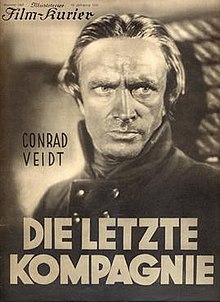
Rasputin, Demon with Women is a 1932 German drama film directed by Adolf Trotz and starring Conrad Veidt, Paul Otto and Hermine Sterler. It was shot at the Halensee Studios and Terra Studios in Berlin. The film's sets were designed by the art directors Gustav A. Knauer and Walter Reimann. It portrays the influence wielded by Grigori Rasputin over the Russian Royal Family around the time of the First World War. It was released the same year as an American film about him Rasputin and the Empress. Felix Yusupov sued the filmmakers for his portrayal, but ultimately dropped his case. The film was banned in Germany in 1933 following the Nazi Party's rise to power.

Fusilier Wipf is a 1938 Swiss drama film directed by Hermann Haller and Leopold Lindtberg and starring Paul Hubschmid, Heinrich Gretler and Robert Trösch. When the First World War breaks out, a hairdresser's assistant in neutral Switzerland is mobilised for border protection duty. Serving in the army, he grows from a boy into a man and develops a greater love for his country. The film was part of the intellectual spiritual defence of Switzerland during the era as the country maintained a neutral stance in the years leading up to the Second World War, which began a year after the film was released.

William Tell is a 1923 German silent adventure film directed by Rudolf Dworsky and Rudolf Walther-Fein and starring Hans Marr, Conrad Veidt, and Erich Kaiser-Titz. The film portrays the story of the legendary Swiss national hero William Tell. The sets were designed by Rudi Feld. It premiered at the Marmorhaus in Berlin.
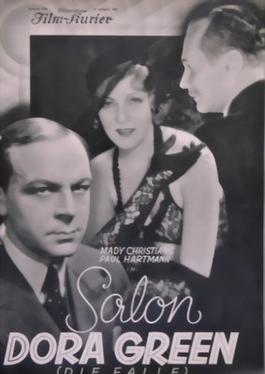
The House of Dora Green is a 1933 German thriller film directed by Henrik Galeen and starring Mady Christians, Paul Hartmann, and Leonard Steckel. It was based on the novel Diplomatische Unterwelt by Hans Rudolf Berndorff. It was the final German film made by Galeen, before being forced into exile following the Nazi Party's takeover of power. The film's sets were designed by the art director Gustav A. Knauer. In 1937 it was released in the United States.

William Tell is a 1934 German-Swiss historical drama film directed by Heinz Paul and starring Hans Marr, Conrad Veidt and Emmy Göring. It is based on the 1804 play William Tell by Friedrich Schiller about the Swiss folk hero William Tell. It was made in Germany by Terra Film, with a separate English-language version supervised by Manning Haynes also being released. It was shot at the Marienfelde Studios of Terra Film in Berlin with location shooting in Switzerland. While working on the film Veidt, who had recently given sympathetic performances of Jews in Jew Suss (1934) and The Wandering Jew, was detained by the authorities. It was only after pressure from the British Foreign Office that he was eventually released. It is also known by the alternative title The Legend of William Tell.

Land Without Women is a 1929 German drama film directed by Carmine Gallone and starring Conrad Veidt, Elga Brink and Clifford McLaglen. It was based on the novel Die Braut Nr. 68 by Peter Bolt. The film is set amongst a community of gold diggers in Western Australia. It was shot at the Staaken and Templehof Studios in Berlin with sets designed by the art directors Hans Sohnle and Otto Erdmann. It was made by the small independent production company Felsom Film using the Tri-Ergon sound-on-film process, the first full-length German-speaking sound film to be released. It was followed a month later by the first all-talking film Atlantik, which had been made in Britain.
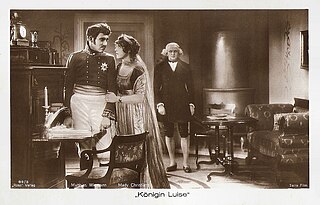
Queen Louise is a German silent historical film directed by Karl Grune and starring Mady Christians, Mathias Wieman, and Anita Dorris. It was released in two separate parts slightly less than a month from each other in December 1927 and January 1928. It commenced a series of historical epics directed by Grune. It was shot partly at the Terra Studios in Berlin. The film's sets were designed by the art director Hans Jacoby.

The Flight in the Night is a 1926 German silent drama film directed by Amleto Palermi and starring Conrad Veidt, Robert Scholz and Angelo Ferrari. It was based on the play Henry IV by Luigi Pirandello. The art direction was by Hermann Warm. It was shot on location in Tuscany in Italy.

A Student's Song of Heidelberg is a 1930 German musical film directed by Karl Hartl and starring Hans Brausewetter, Betty Bird and Willi Forst. It marked Hartl's directoral debut. The film is in the tradition of the nostalgic Old Heidelberg.

Love Is Blind is a 1925 German silent comedy film directed by Lothar Mendes and starring Lil Dagover, Conrad Veidt and Lillian Hall-Davis. It was shot at the Babelsberg Studios in Berlin. The film's sets were designed by Hans Jacoby. It was produced and distributed by UFA, Germany's largest film company of the Weimar Era.
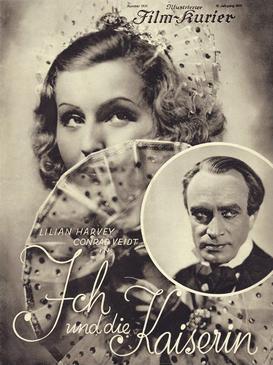
The Empress and I is a 1933 German musical comedy film directed by Friedrich Hollaender and starring Lilian Harvey, Mady Christians and Conrad Veidt. It is also known by the alternative title of The Only Girl. The film was produced as a multi-language version. Moi et l'impératrice a separate French-language version was released as well as The Only Girl in English. Multilingual Harvey played the same role in all three films.

Liselotte of the Palatinate is a 1966 West German historical comedy film directed by Kurt Hoffmann and starring Heidelinde Weis, Harald Leipnitz and Karin Hübner. It portrays the marriage of the German princess Liselotte of the Palatinate to Philippe I, Duc d'Orléans the brother of Louis XIV and her adventures at the French court.

That's No Way to Land a Man is a 1959 West German comedy film directed by Hans Deppe and starring Grethe Weiser, Karin Dor and Karin Baal. It was shot at the Göttingen Studios. The film's sets were designed by the art director Willi Herrmann.
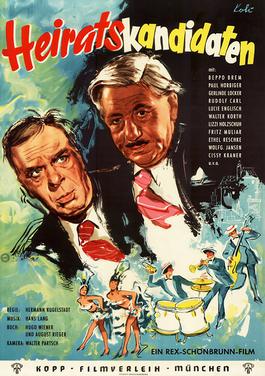
Candidates for Marriage is a 1958 Austrian-West German comedy film directed by Hermann Kugelstadt and starring Beppo Brem, Paul Hörbiger and Gerlinde Locker. It was shot at the Schönbrunn Studios in Vienna and on location around the city. The film's sets were designed by the art director Wolf Witzemann.
Temperamental Artist is a 1920 German silent film directed by Paul Otto and starring Conrad Veidt, Aud Egede-Nissen, and Frida Richard.

The First Right of the Child is a 1932 German drama film directed by Fritz Wendhausen and starring Hertha Thiele, Eduard Wesener and Helene Fehdmer.

The Path of Death is a 1917 German silent drama film directed by Robert Reinert and starring Maria Carmi, Carl de Vogt and Conrad Veidt. It marked the screen debut of Veidt. The film was shot in late 1916, but released the following year. It is a lost film.
Not of the Woman Born is a 1918 German silent film directed by Franz Eckstein and Rosa Porten and starring Ferry Eschenauer, Helene Stein, and Conrad Veidt.
The Mexican is a 1918 German silent film directed by Carl Heinz Wolff and starring Ferdinand Bonn and Conrad Veidt. It is a lost film.
The Clan is a 1920 German silent drama film directed by Carl Wilhelm and starring Ressel Orla, Johannes Riemann and Conrad Veidt.
